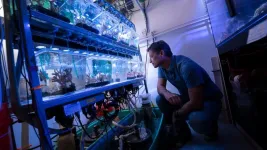(Press-News.org) Mill Valley, CA – September 10, 2024 – The SynGAP Research Fund 501(c)(3) announced a collaboration with Unravel Biosciences, Inc., an AI-enabled therapeutics company, to initiate a clinical study aimed at generating primary clinical data, uncovering novel therapeutic targets, repurposing existing drugs, and stratifying SYNGAP1-Related Disorders (SRD) patients into subgroups based on their predicted response to selected drugs. This collaboration will utilize Unravel’s rareSHIFT™ discovery services and BioNAV™ AI platform to advance the development of targeted therapies for SRD.
As part of this study, Unravel will employ its proprietary nasal swab collection methodology to gather RNA transcriptomes from SRD patients and matched healthy family members. The study is unique in its dual approach: analyzing a large cohort of patients with diverse mutations and symptoms. The datasets will be processed using Unravel’s BioNAV™ AI-driven drug and target prediction platform, simulating the response of over 40,000 molecules. This will help identify drug candidates that are most likely to be effective for patients with various specific genetic mutations and symptom severities. The results of this study will inform SRF’s clinical translation strategy, generating repurposing candidates as well as novel, optimized therapeutic targets.
Why SRF is Pursuing This Project
The Syngap Research Fund (SRF) is deeply committed to finding better treatments for children with SYNGAP1-Related Disorders as quickly as possible. This partnership with Unravel Biosciences is a significant step forward in that mission. By using advanced AI and innovative methods, we aim to rapidly identify the most effective therapies that can improve the lives of SRD patients. Our goal is simple: to find better drugs now that can reduce suffering for people affected by SYNGAP1-Related Disorders.
Building on Unravel Biosciences' Success in Rare Disease Research
Unravel Biosciences has a strong track record in rapidly identifying and advancing drug candidates for complex diseases, particularly rare neurodevelopmental disorders. Recently, Unravel expanded its collaboration with the CSNK2A1 Foundation to accelerate the identification of drug candidates for Okur-Chung Neurodevelopmental Syndrome, a condition with genetic similarities to SYNGAP1-Related Disorders. This expansion highlights Unravel’s commitment and expertise in applying AI-driven drug discovery to rare genetic conditions. Additionally, Unravel's platform has led to four clinical trials starting in 2024, including RVL002 and RVL027, further demonstrating the efficacy of their approach.
SRF Family Donations Make Progress Possible
“Thank you to our donors who made this project possible. We are eager to leverage Unravel to find more options for our families. Parents are fighting epilepsy, autism, sleep, behavior and multiple other challenges. We need better drugs and we need them urgently,” says SRF’s Founder, Mike Graglia.
What the Scientists Are Saying
SRF’s CSO, Kathryn Helde, says,“The Unravel approach is a powerful and fast combination of molecular readouts from patients with AI-driven analysis of bioinformatics. While SRF has supported other drug discovery efforts, they have each looked for answers in a different way. I am excited about this particular effort, and we expect to have candidates in as soon as 3 months.”
“We are excited to partner with SRF on this critical, large-scale study of SYNGAP1 patient drug response,” said Richard Novak, Ph.D., Unravel Co-Founder and CEO. “Our personalized target discovery approach combined with a population-level study to understand drug response differences across SYNGAP1 patients will enable rapid drug development for patients needing effective treatments today. Working directly with a patient population will further accelerate and clinically de-risk SRF’s existing preclinical programs to optimize clinical development strategies.”
“The role of patient families in advancing science and enabling the research community to find treatments for rare diseases such as SYNGAP1 is critical,” said Frederic Vigneault, Co-Founder and CSO of Unravel. “Many recent advances in our basic scientific understanding of disease mechanisms and early-stage drug development have been made possible by direct financial contributions from families and caregivers of patients, and we are truly grateful for that support.”
About Unravel Biosciences
Unravel Biosciences is the first rapid prototyping therapeutics company, integrating AI systems biology computation with rapid in vivo screening and clinical validation of discovered targets with unprecedented efficiency. Unravel leverages its proprietary BioNAV™ platform combining target and drug discovery, preclinical screening, and patient stratification to find treatments for complex diseases. Unravel's platform has led to four clinical trials starting in 2024. Unravel's platform developed RVL002, a first-in-class new small molecule targeting mitochondrial metabolism, and RVL027, a molecule targeting a novel mechanism to treat dystonias. The rareSHIFT™ program provides platform access to foundation and biotech partners to accelerate and clinically derisk therapeutics. For more information, visit www.unravel.bio and www.rareshift.org.
About SYNGAP1-Related Disorders (SRD)
SYNGAP1-Related Disorders (ICD-10 F78.A1; ICD-11 LD90.Y) is a rare genetic disorder caused by variants on the SYNGAP1 gene that reduce SynGAP protein levels. SRF has identified over 1,454 patients to date, and the number grows weekly. This protein acts as a regulator in the synapses (where neurons communicate with each other). When SynGAP protein levels are too low, we see an increase in excitability in the synapses making it difficult for neurons to communicate effectively. This leads to many neurological issues seen in SynGAP patients.
Symptoms of SYNGAP1 include primarily neurological issues, including autism spectrum disorder, intellectual disability, epilepsy, hypotonia (low muscle tone), gross and fine motor delays, and visual abnormalities such as strabismus (crossed eyes) as well as gastrointestinal challenges and disordered sleep.
About the SynGAP Research Fund (SRF)
The mission of the SynGAP Research Fund (SRF) is to improve the quality of life for SYNGAP1 patients through the research and development of treatments, therapies, and support systems.
SRF was founded in the US in 2018 as a 501(c)(3) US public charity, and families created sister organizations for SRF in the UK in 2020, in Europe (Netherlands) in 2022, and in Latin America (Colombia) in 2023.
Completely family-led, SRF is the largest non-government funder of SynGAP research having committed over $6 million in grants. The founders cover operational costs, ensuring donations fund science & patient-related programs. SRF’s grant program awards one or two-year grants to investigators, physician residents, and clinicians interested in studying SYNGAP1. SRF grants are intended to help researchers explore novel ideas and answer open questions related to the clinical aspects of and therapies for SRD.
For more on SRF, visit curesyngap1.org or follow @cureSYNGAP1 on LinkedIn, YouTube, Instagram, Facebook, TikTok, or X.
SRF is a member of FasterCures, COMBINEDbrain, Global Genes Foundation Alliance, Everylife Foundation Community Congress, Epilepsies Action Network, Personalized Medicine Coalition, Rare Epilepsy Network, Epilepsy Leadership Council, Alliance for Genetic Etiologies in Neurodevelopmental Disorders and Autism (AGENDA), California Action Link for Rare Diseases, American Brain Coalition, Genetic Alliance UK, Rare Disease UK, Syndromes Without a Name (SWAN UK), Jumpstart Program, Patient Worthy, Autism Brain Net, Innovation and Value Initiative, Rare Disease Diversity Coalition, Cambridge Rare Disease Network, Breaking Down Barriers, Rare-X, Mencap, IndoUSRare, and The World Orphan Drug Congress.
END
Unravel Biosciences and SynGAP Research Fund (SRF) Announce clinical research to accelerate new and repurposed therapies for SYNGAP1-related disorders
A novel approach hopes to find a treatment for SYNGAP1-Related Disorders sooner rather than later.
2024-09-10
ELSE PRESS RELEASES FROM THIS DATE:
The Paul G. Allen Frontiers Group announces Allen Discovery Center for Neurobiology in Changing Environments
2024-09-10
SEATTLE, WASH.—September 10, 2024—Climate change is rapidly reshaping our oceans, stressing the nervous systems of marine organisms that have evolved over millions of years. Scientists now face a critical question: How do these environmental shifts affect these animals’ ability to sense and respond to their changing world?
To address this pressing issue, the Paul G. Allen Frontiers Group, a division of the Allen Institute, today announced the launch of the Allen Discovery Center (ADC) for Neurobiology in Changing Environments. This initiative, based at Scripps Institution of Oceanography at the University of California ...
Clinical hypnosis vs. cognitive behavioral therapy: What's better for managing hot flashes?
2024-09-10
CLEVELAND, Ohio (Sept 10, 2024)–Nonhormone options for hot flashes and other menopause symptoms are growing in popularity, especially for women who cannot take hormones due to health complications. Cognitive behavioral therapy and clinical hypnosis are common nonhormone treatment options. According to a new scoping review, however, one is more effective than the other. Results of the scoping review will be presented at the 2024 Annual Meeting of The Menopause Society in Chicago September 10-14.
Recognizing that a percentage of menopausal women cannot take hormone therapy either because of health restrictions, such as being a breast ...
Exploring the possible link between PTSD and early menopause
2024-09-10
CLEVELAND, Ohio (Sept 10, 2024) – Post-traumatic stress disorder (PTSD) can cause an array of adverse mental health effects, but physical side effects are also common. A new study conducted with Persian Gulf War female military personnel demonstrates that women with probable PTSD are twice as likely to experience early menopause and related health consequences. Results of the study will be presented at the 2024 Annual Meeting of The Menopause Society in Chicago September 10-14.
Commonly reported symptoms of PTSD include anger outbursts, anxiety, and difficulty concentrating and sleeping. Physically, PTSD can also be responsible for serious ...
Is hormone therapy good for heart health?
2024-09-10
CLEVELAND, Ohio (Sept 10, 2024)–Recent studies show that women can experience bothersome menopause symptoms, like hot flashes, for longer than originally estimated. As a result, more research is focusing on the long-term effects of hormone therapy. A new study suggests certain estrogen-based hormone therapies have favorable long-term effects on the risk of heart disease. Results of the study will be presented at the 2024 Annual Meeting of The Menopause Society in Chicago September 10-14.
Hormone therapy has been the subject of intense debate for more ...
Mass production of metal nanowires possible by breakthrough technique
2024-09-10
A group from Nagoya University in Japan has created a new technique for growing the tiny metal nanowires (NWs) that are expected to be used in next-generation electronics. Their results suggest a way to mass produce pure metal NWs, which has until now limited their use. The new technique promises to enhance the efficiency of electronics production, including circuitry, LEDs, and solar cells. The study was published in Science.
Mass production of NWs has been challenging because of the difficulties of scaling production while maintaining quality and ...
Methane emissions are rising faster than ever
2024-09-10
The world has not hit the brakes on methane emissions, a powerful driver of climate change. More than 150 nations have pledged to slash by 30% this decade under a global methane pledge, but new research shows global methane emissions over the past five years have risen faster than ever.
The trend “cannot continue if we are to maintain a habitable climate,” the researchers write in a Sept. 10 perspective article in Environmental Research Letters published alongside data in Earth System Science Data. Both papers are the work of the Global ...
New study to explore novel marker in interstitial lung disease prognosis
2024-09-10
Researchers at the University of Exeter and clinical radiopharmaceutical company Serac Healthcare Ltd are researching a new molecular imaging marker which could help to detect disease progression sooner.
The novel imaging agent 99mTc-maraciclatide has been used to scan the first patient with the aim of evaluating the marker’s potential for predicting interstitial lung disease in a Phase II study titled ‘PRospective Evaluation of Interstitial Lung Disease progression with quantitative CT’ ...
Experimenting with different vapes could be crucial to help people quit smoking
2024-09-10
New research from the University of East Anglia (UEA) found that more than a third of quitters who were given a vape in A&E experimented with different devices bought from shops or online
People who smoke and had little experience with vapes were particularly receptive to an opportunistic approach in a medical setting
The study found that some quitters reduced their vaping significantly within a few months, showing that not everyone who uses an e-cigarette becomes dependent on vaping long-term
Peer-reviewed – Observational Study- People
Experimenting with commercially ...
Long-term exercisers have 'healthier' belly fat
2024-09-10
People with obesity who are long-time exercisers have healthier belly fat tissue and can store fat there more effectively than nonexercisers with obesity, according to a new study from a team of researchers at the University of Michigan.
The research team also grew fat tissue in the lab from cells collected from both exercisers and nonexercisers, and cells from the exercisers developed into a tissue that stored fat more effectively.
"Our findings indicate that in addition to being a means to expend calories, exercising regularly for several months to years seems to modify your fat tissue ...
Gene therapy effective in hereditary blindness
2024-09-10
Bothnia dystrophy is a form of hereditary blindness, prevalent in the region Västerbotten in Sweden. A new study at Karolinska Institutet published in Nature Communications shows that gene therapy can improve vision in patients with the disease.
Bothnia dystrophy occurs mainly in the region Västerbotten in Sweden, but the disease has also been identified in other parts of the world. The disease leads to progressive visual impairment due to the destruction of the visual cells in the retina. It is caused by an inherited genetic mutation ...
LAST 30 PRESS RELEASES:
Novel camel antimicrobial peptides show promise against drug-resistant bacteria
Scientists discover why we know when to stop scratching an itch
A hidden reason inner ear cells die – and what it means for preventing hearing loss
Researchers discover how tuberculosis bacteria use a “stealth” mechanism to evade the immune system
New microscopy technique lets scientists see cells in unprecedented detail and color
Sometimes less is more: Scientists rethink how to pack medicine into tiny delivery capsules
Scientists build low-cost microscope to study living cells in zero gravity
The Biophysical Journal names Denis V. Titov the 2025 Paper of the Year-Early Career Investigator awardee
Scientists show how your body senses cold—and why menthol feels cool
Scientists deliver new molecule for getting DNA into cells
Study reveals insights about brain regions linked to OCD, informing potential treatments
Does ocean saltiness influence El Niño?
2026 Young Investigators: ONR celebrates new talent tackling warfighter challenges
Genetics help explain who gets the ‘telltale tingle’ from music, art and literature
Many Americans misunderstand medical aid in dying laws
Researchers publish landmark infectious disease study in ‘Science’
New NSF award supports innovative role-playing game approach to strengthening research security in academia
Kumar named to ACMA Emerging Leaders Program for 2026
AI language models could transform aquatic environmental risk assessment
New isotope tools reveal hidden pathways reshaping the global nitrogen cycle
Study reveals how antibiotic structure controls removal from water using biochar
Why chronic pain lasts longer in women: Immune cells offer clues
Toxic exposure creates epigenetic disease risk over 20 generations
More time spent on social media linked to steroid use intentions among boys and men
New study suggests a “kick it while it’s down” approach to cancer treatment could improve cure rates
Milken Institute, Ann Theodore Foundation launch new grant to support clinical trial for potential sarcoidosis treatment
New strategies boost effectiveness of CAR-NK therapy against cancer
Study: Adolescent cannabis use linked to doubling risk of psychotic and bipolar disorders
Invisible harms: drug-related deaths spike after hurricanes and tropical storms
Adolescent cannabis use and risk of psychotic, bipolar, depressive, and anxiety disorders
[Press-News.org] Unravel Biosciences and SynGAP Research Fund (SRF) Announce clinical research to accelerate new and repurposed therapies for SYNGAP1-related disordersA novel approach hopes to find a treatment for SYNGAP1-Related Disorders sooner rather than later.



